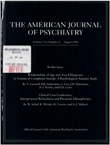A double-blind dose-reduction trial of fluphenazine decanoate for chronic, unstable schizophrenic patients
Abstract
OBJECTIVE: This study evaluated the feasibility and impact of gradually reducing relatively high doses of fluphenazine decanoate by one-half for chronically impaired, poor inner-city patients with schizophrenia. METHOD: Forty-three patients currently receiving an average of 23 mg (0.3 mg/kg) of fluphenazine decanoate every 2 weeks were divided alternately into a group to remain at current doses (control group) and a group to undergo stepwise 50% dose reduction over 5 months under double-blind conditions. Clinical status and side effects were assessed quarterly for a year. Relapse was determined clinically and by changes in psychopathology ratings. RESULTS: Eighty-six percent (N = 37) of the patients (control group, N = 17; reduced-dose group, N = 20) completed the study. The groups did not differ at baseline in demographic or clinical variables or neuroleptic dose. In the reduced-dose group, doses were lowered to an average of 11.5 mg every 2 weeks. The two groups did not differ throughout the year in number of relapses, and hospitalization rates fell similarly in both (overall, by about 67%). Clinical measures changed little. Extrapyramidal symptoms worsened in the control group but improved slightly in the reduced-dose group. Tardive dyskinesia worsened in both groups, but less in the reduced- dose group. CONCLUSIONS: Maintenance neuroleptic doses much lower than the conventional ones can be achieved safely in schizophrenic patients by gradual reduction, without clinical worsening and perhaps with fewer extrapyramidal symptoms and less tardive dyskinesia. The two-thirds lower hospitalization rate, with substantial financial savings, apparently was due to nonspecific effects of research intervention.
Access content
To read the fulltext, please use one of the options below to sign in or purchase access.- Personal login
- Institutional Login
- Sign in via OpenAthens
- Register for access
-
Please login/register if you wish to pair your device and check access availability.
Not a subscriber?
PsychiatryOnline subscription options offer access to the DSM-5 library, books, journals, CME, and patient resources. This all-in-one virtual library provides psychiatrists and mental health professionals with key resources for diagnosis, treatment, research, and professional development.
Need more help? PsychiatryOnline Customer Service may be reached by emailing [email protected] or by calling 800-368-5777 (in the U.S.) or 703-907-7322 (outside the U.S.).



